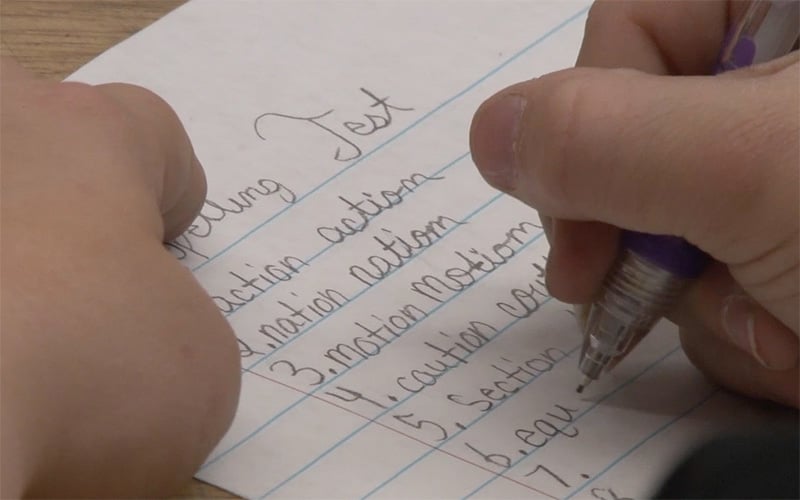
A new bill would make cursive writing mandatory in Arizona schools.
(Photo by Amanda Kukkola/Cronkite News)
LAKE HAVASU CITY – Students in third grade at Starline Elementary School in Lake Havasu City are picking up their pencils, and learning cursive writing.
But cursive writing is not a requirement of the Common Core standards, adopted by Arizona in 2010. But Senator and Majority Whip, Gail Griffin (R-14) sponsored SB1197, the cursive reading/writing requirement bill.
Sen. John Kavanagh (R-23), one of the co-signers of the bill, said he wished he had taken a typing class back in high school. He feels that role will soon be reversed, and if kids grow up without learning how to write or read cursive.
“Right now, cursive and keyboard skills are at the same level of importance, the most typing kids seem to do is with their two thumbs,” Kavanagh said.
Shawna Smith, a third grade writing teacher at Starline Elementary School, believes that cursive is a way of helping kids with their motor skills and that some kids who even have trouble with print can do cursive very nicely and without it, our future students wouldn’t be able to understand documents that made up our country.
“I think the kids definitely need exposure to it,” says Smith. “Some of our historical documents like the Declaration of Independence were written in cursive. Without the ability to recognize cursive, I think you’re limiting your documents that you’re able to read and communicating with older people. I know my grandma still writes in cursive, and a lot of grandparents do. It’s a way of communicating the kids do need to be aware of.”
Smith, along with other third grade teachers like Theresa Nigg teach their students the skill even though it’s not required.
“I don’t test it or require it, but we do practice it,” says Nigg. “I think that everyone should be taught cursive. I feel like this bill will allow all of us to be on the same page instead of some of the teachers or districts mandating it and requiring it and some not. I think it’s a great idea.”
Third-grader Olivia Bargos said she enjoys learning cursive more than typing.
“What makes it fun is you get to [like you] never pick up your pencil, you always get to write and it looks so weird and I’m weird so I like it,” Bargos said.
The Arizona Department of Education also supports the bill.
“The Superintendent sees cursive writing as something that may seem like a relic from the past [but Douglas] sees it as very valuable and she sees it as being more than just being able to sign your name,” Charles Tack, Public Information Officer of the Arizona Department of Education told Cronkite News.
“I think that there has to be a balance, when you look at technology and the way it’s expanding of course you can’t ignore that,” Tack said. “Obviously for students to be prepared to succeed in the 21st century, they are working their way through school, with technology playing an important part in their class room.”
An amendment on the bill would exclude cursive writing from being part of the statewide achievement test, if SB1197 passes and is signed into law.